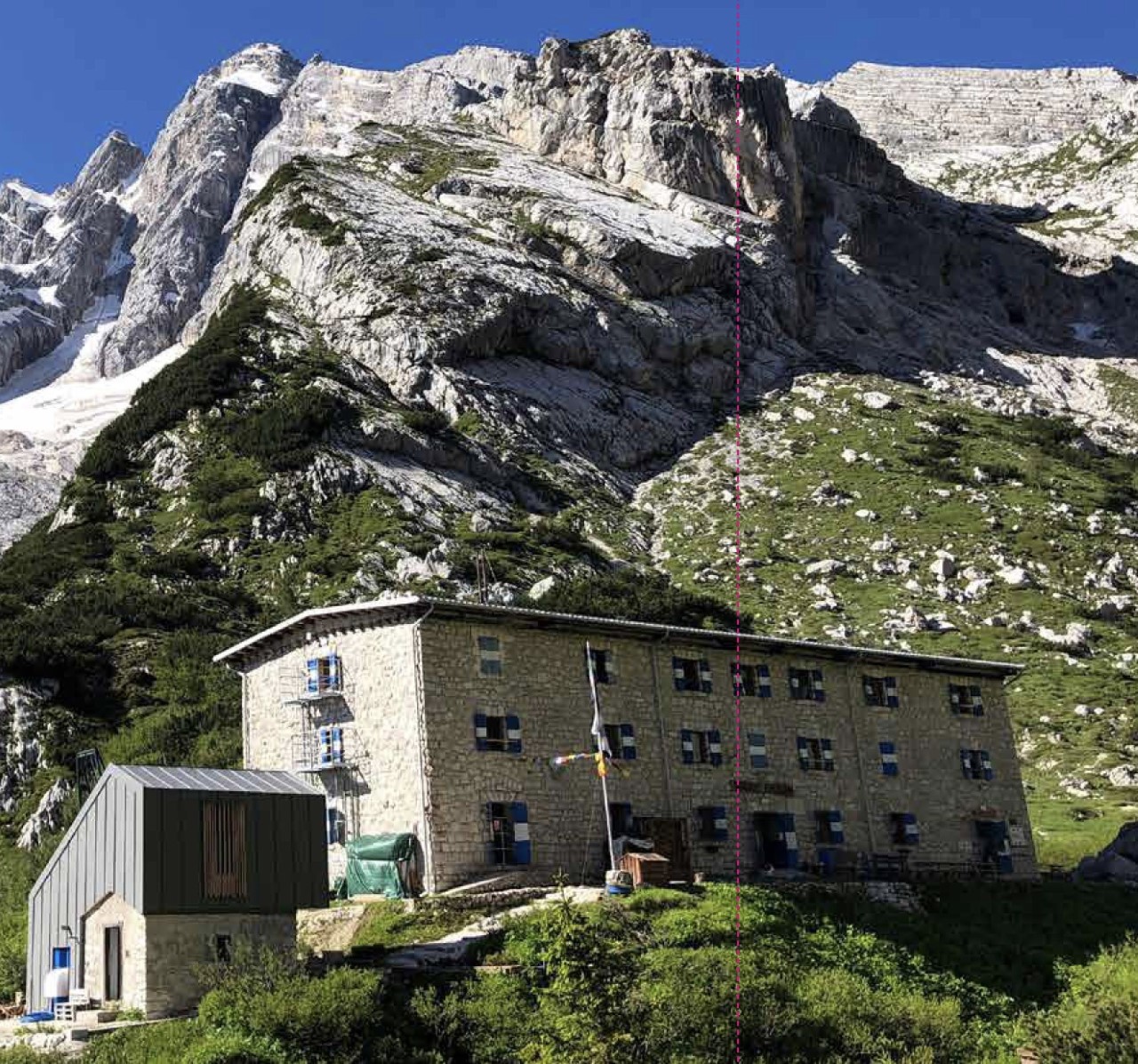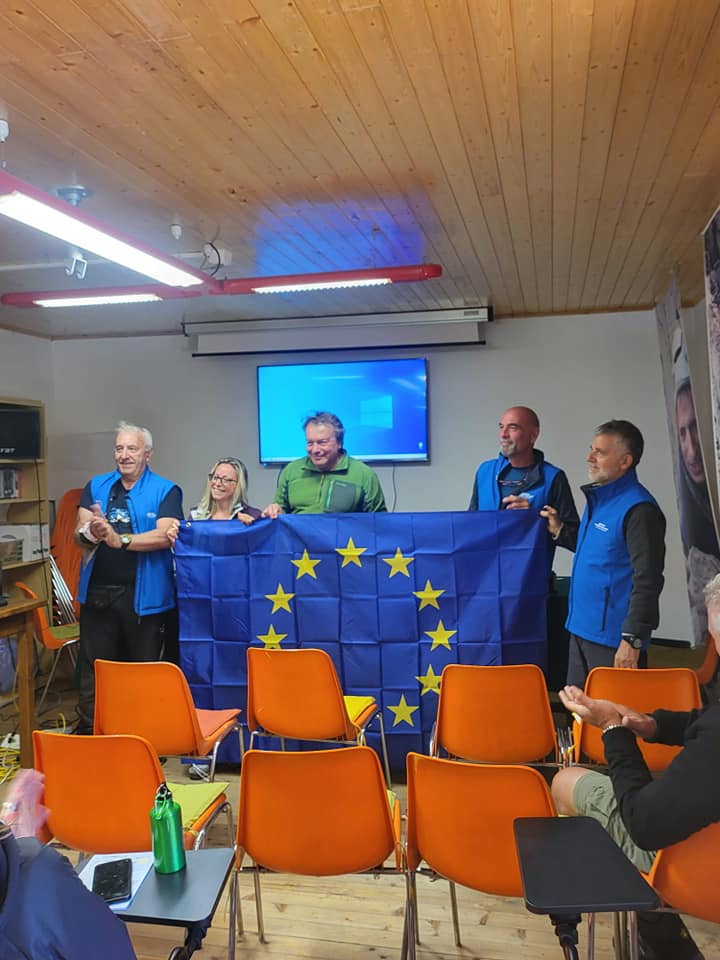07-09.07.2022 "The source water: from the Dolomiti to the Sea"
From Thursday, July 7 to Saturday, July 9, 2022, the conference "The Water Resource: from the Dolomites to the Sea from Springs to Mouths' was held at the Shelter Pietro Galassi - City of Mestre at Forcella Piccola of the Antelao, Calalzo di Cadore (BL). The three-day event aimed to discuss the water resource with contributions designed to highlight its characteristics and vulnerability along its entire course: from springs to mouths. Veneto is an area still rich in this primary resource even if it is seeing a drastic decrease in its reserves represented by glaciers: being aware of this and taking action is a duty to all humanity.
The entire citizenry was able to follow the three days of work online www.facebook.com/rifugiogalassi and then be in person on Saturday, July 9, 2022.
The initiative was the result of a collaboration between the City of Venice, CAI Italian Alpine Club, Regional Office UNESCO for the science and culture in Europe, CNR National Council for Research, Fondation Dolomiti UNESCO and Europe Direct Venezia Veneto of the City of Venice.
The meeting also promoted the project "Mountain refuges sentinels of climate and the environment," which is the result of the framework agreement signed between the National Research Council (CNR) and the Italian Alpine Club CAI with the aim of improving knowledge of high-altitude environments and ecosystems, as well as understanding of current climate phenomena.
"The managers of the Galassi Shelter city of Mestre - explains the president of the CAI Mestre Alessandro Bonaldo - They are now touching it on a daily basis. With the gaze we are getting used to no longer seeing the tongues of spring snow that permeated until mid-July "the tent" of ice below the summit of Antelao. Here, then, is the importance of bringing together all the institutions that are called upon to defend and conserve the environment and to convey a new sustainable approach on the part of mountain users."
“Climate change - adds Rosalia Santoleri, president of the Italian Oceanographic Commission and director of the Institute of the Marine Science CNR Venice – is increasingly causing extreme weather phenomena, such as droughts, heat waves and floods. The conference aims to open a debate and discussion involving political institutions, cultural institutions and scientific research, open to citizens to discuss the state of knowledge and the tools available to preserve this resource that is indispensable for life and for the maintenance of ecosystems."
"We are strongly counting on - concludes the Councillor for the Environment for the City of Venice Massimiliano De Martin - in the collaboration between the different actors, public and private in different capacities involved, that imposes the challenge for the protection of the water and climate resource for Venice and its territory 'from source to mouth', in an inseparable unicum, as well as in the active contribution that the entire local community will be able to make so that the sustainable management of the water resource and climate adaptation will find humus starting from individual behaviors in every household, business or public space."
=> Tuesday 7th of July:
- 8:30 a.m. Arrival in Calalzo - Praciadelàn (the hut provides three all-terrain vehicles for transfer from Praciadelàn to Capanna Alpina)
10.15 a.m. Arrival at Capanna Alpina in Val d'Oten
10.30 Meeting with the Authorities: President of Belluno Province Roberto Padrin, Mayor of Calalzo di Cadore Luca De Carlo, Mayor of San Vito di Cadore Emanuele Caruzzo
11.00 Departure for the path up to the Refuge (cable car for luggage transfer)
13.00 Arrival (accommodation in the refuge)
13.30 Lunch
15.00 Conference opening: presentation and greetings Mayor of Venice, Luigi Brugnaro; CAI General President, Antonio Montani; UNESCO Regional Office for Science and Culture in Europe Director, Ana Luiza M. Thompson-Flores; CNR-ISMAR Director, Rosalia Santoleri; Head of Representation in Milan, European Commission, Massimo Gaudina
15.30 UNESCO Chair "Water Culture SDGs: transdisciplinary proposals for academic training" (Chiara Biscarini & Lisa Bitossi University for Foreigners of Perugia)
16.15 UNESCO: The Intergovernmental Hydrological Program IHP and the United Nations World Water Development Report 2022 "Groundwater: making the invisible visible" (Jonathan Baker, UNESCO Regional Office for Science and Culture in Europe)
17.00 Coffee Break
17.15 Climate warming and its effects on the Mediterranean Region (Rosalia Santoleri, CNR-ISMAR)
18.00 The effects of climate change on the Po delta and coastal areas of the Northern Adriatic (Davide Bonaldo, Christian Ferrarin, CNR-ISMAR)
18.45 Climate mitigation and adaptation plan for the city of Venice (Massimiliano De Martin & Cristiana Scarpa, City of Venice)
19.30 Dinner
=> Friday 8th July:
7.30 Breakfast
8.30 a.m. Excursion to the Lower Antelao Glacier
12.00 Mountain refuges sentinels of climate and environment and the CAI-CNR Convention- Inauguration of the meteorological station at the Galassi refuge; (Giuliano Cervi, President of the CAI Central Scientific Committee; Paolo Bonasoni, CNR-ISAC, CAI-CNR Steering Committee)
13.00 Lunch
15.00 Alpine refuges and the water resource: supply and treatment of wastewater; the experience of the Galassi refuge (Francesco Abbruscato & Silvio Zanatta, CAI)
15.45 The contribution of scientific research in understanding the river-delta-sea relationship system: the DANUBIUS Research Infrastructure (Debora Bellafiore, CNR-ISMAR)
16.30 Coffee break
16.45 Anthropogenic uses of water resources: urban, agricultural, ecosystem (Antonio Lo Porto, CNR-IRSA)
17.30 Dryland water management and the Marzenego river park (Massimiliano De Martin & Danilo Gerotto Municipality of Venice)
18.15 The role of the Europe Direct network in communicating the European Green Deal (Francesca Vianello, Europe Direct Venezia Veneto of the City of Venice)
18.30 Water from the Dolomites to the sea: a qualifying element of the landscape (UNESCO Dolomites Foundation); Integrated approaches for the management of the UNESCO World Heritage Site Venice and its Lagoon (Katia Basili, City of Venice)
19.30 Dinner
21.00 The UNESCO World Network of Water Museums - the Water Museum of Venice (Francesca Bampa, UNESCO Regional Office for Science and Culture in Europe & Pietro Lacasella, Water Museum of Venice)
=> Saturday 9th July:
7:30 Breakfast
8.30 a.m. Excursion to the Little Fork
10.15 The drastic reduction of alpine glaciers and the consequences on water resources and biodiversity (Guido Nigrelli, CNR-IRPI, remotely connected from the Gastaldi Refuge)
11.00 CAI's Citizen Science project: "Let's study the Ibex together" (Giuseppe Borziello, CAI and Mauro Bon, Natural History Museum of Venice)
11.45 Conclusion of the conference and greetings
12:30 Lunch
15.00 Valley descent: Capanna degli Alpini, then off-road to Praciadelàn

Water is a precious, irreplaceable but not infinite resource. It is fundamental to life on our Planet: indispensable for all living things (animals, humans and plants) and necessary to keep our bodies healthy. Unfortunately, its availability is not infinite, it is a limited resource, and this causes a number of critical issues on a local and global scale. For this reason, among the Sustainable Development Goals (SDGs) defined in 2015 by the 150 international leaders who met at the United Nations to contribute to global development, promote human well-being and protect the environment is "Ensure the availability and sustainable management of water and sanitation for all." The issues of access, reduced quantities available are compounded by the fact that water contamination is increasing as a direct result of industrial water waste and inadequate waste elimination. What's more, climate change is increasingly causing extreme weather phenomena, such as droughts and floods. Veneto is an area still rich in this primary resource even though it is seeing its reserves represented by glaciers drastically diminishing; being aware of this and preserving it is a duty to all humanity. It is necessary, however, even where there are no problems of access or availability, to ensure due respect: the decrease in the size of a glacier, the drying up of a resurgence, the lowering of an aquifer, the pollution of a rural well and of the sea are now unbearable events for an environment, already stressed by countless daily attacks.
The right path to pursue seems to be the one mapped out in the European context where we set out to ensure: the protection and improvement of the status of aquatic ecosystems, as well as the terrestrial ecosystems and wetlands that depend on them; sustainable water use based on the long-term protection of available water resources; enhanced protection of the aquatic environment enabling its improvement, including through the adoption of specific measures for the gradual reduction of discharges, emissions and losses of priority substances, and the cessation or phasing out of discharges, emissions and losses of hazardous substances; the halting and gradual reduction of groundwater pollution; and an effective contribution to the mitigation of the effects of floods and droughts. With reference to the effects that climate change is having on water resources we recall that with the Glasgow Pact, signed at COP26 in Scotland, the global community once again highlighted the seriousness of the climate problem we are facing, establishing a milestone toward the process of adaptation and reduction of climate-changing emissions. The agreement also emphasizes the importance of acting both globally and locally on climate adaptation, paying particular attention to the protection and redevelopment of ecosystems and the involvement of local communities, even going beyond the administrative boundaries characterizing local governments. These are all aspects that the City of Venice feels the urgency of and that with the Climate Plan have been declined for the specificities of our territory. We strongly count on the collaboration between the different subjects, public and private in different capacities involved, which imposes the challenge for the protection of the water and climate resource for Venice and its territory "from the source to the mouth," in an inseparable unicum, as well as on the active contribution that the entire local community will be able to give so that the sustainable management of the water resource and climate adaptation will find humus starting from individual behaviors in every household, business and public space.
Some pictures of the event:



For info:
Comune di Venezia
EUROPE DIRECT VENEZIA VENETO
Ca' Farsetti, San Marco 4136 - 30124 Venezia
numero verde 800 496200
fax 041 2748182
www.comune.venezia.it/europedirect
infoeuropa@comune.venezia.it
 Regione Veneto
Regione Veneto


